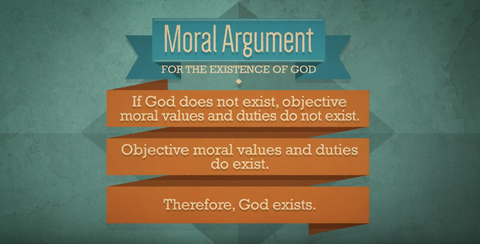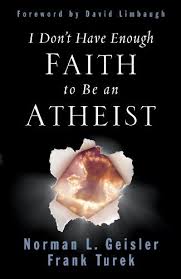Morality and God - How Morality Points to God
October 21, 2021

Can truth be known? What is truth? What is the meaning of truth?
Even Jesus and Pontius Pilate discussed this question.
What is truth Pilate asked Jesus. John 18:38 highlights this what is truth Pontius Pilate question.

Well we will be discussing morality and God in this blog post.
Here is a Table Contents if you would like to skip ahead to a specific section in the blog post:
- What is Truth?
- Self-Defeating Statements
- Objective vs Subjective Truth
- Morality Points to God
- The Moral Argument
- But Why Does God Allow Evil?
- Moral Relativism
- Love Requires Free Will
- I Decide My Own Reality
- Maybe Society Determines What's Right and Wrong
- Recommended Books
What is Truth?
So what is truth in philosophy?
Here is a video which breaks down some of these key concepts:

Self-Defeating Statements
So what is truthfulness?
Some people try to say that truth can't be known.
Well, to make the statement, "truth can't be known", you are saying a "truth statement" that there is no such thing as truth.
Another example of a self-defeating statement is the statement, "Science is the only begetter of truth". Why?
Because you are making a statement (science is the only begetter of truth) which cannot be tested under a microscope, or through the scientific method. Therefore your own statement must not be true, according to your own standards. See the contradiction?
So what is the TRUE conclusion?
Well, here is another short video, highlighting philosopher David Hume, that describes self-defeating, or self-refuting, statements:

Objective Truth vs Subjective Truth
Another important distinction to make when dealing with truth is differentiating between objective vs. subjective truth.
What is objective truth?
Objective truths are facts regardless of how you feel about them.
What is subjective truth?
Subjective truths are true about the subject making the statement.
For instance, to say, "Ice cream is great!" is a subjective truth because it is true about you, the subject, making the statement. But if you were to say, "This ice cream is made with cream," that would be an objective statement because it is true about the object (in this case, the ice cream), regardless of how you, the subject feels about it.
That can get a little hard to understand, so here is a video to better illustrate the point:
Morality Points to God
Here is a quick review of some of the concepts we have covered here in this section (taken from our FREE course), as well as some of the ones we are going to cover in the next section:
The Moral Argument
The moral argument is perhaps the best argument someone can offer for the existence of God.
However, before I show you the moral argument, we must discuss what are called, "objective moral values", or "objective morality". These are things that all cultures, across the world would see as objectively wrong.
This means that it doesn't matter what culture you are apart of, everyone would see something like murdering children, or raping 3-year-olds for fun, as objectively morally wrong.
So that would mean that objective moral values DO exist. Now for the moral argument.
It is a 3-part argument and goes like this:

The distinguished philosopher, Dr. William Lane Craig, whose website ReasonableFaith.org is an absolute gem, explained this argument further in this video:
Dr. Craig has said in many interviews that this is one of, if not his favorite go-to argument, when presenting at college campuses and debates throughout the world.
But Why Does God Allow Evil?
The problem of evil is a serious one. How could a good and loving God allow evil in His world? Well the emotional side of the answer is not such an easy one. It is never easy to comfort someone who has just encountered great loss.
However, logically speaking, the answer is pretty simple. You see, people look at evil in the world, and say, "How could a good God allow all this evil?"
But logically, the answer is actually pretty straight-forward. The fact that there is evil in the world actually points TO a God. Here's why.
If there's evil in the world, then there must be good in the world (because otherwise how would you even know what evil was without knowing what good is). If there is good and evil, then there must be a moral law, something that distinguishes between good and evil, right and wrong.
If there is a moral law, then there must be a moral Lawgiver, someone who established that moral law in the first place. Thus, God. Here is a quick video that explains the concept a bit more:
What is morality? Morality is made up of what we should and should not do. In this section, we will be going over why morality in our world is so important, and how it actually ends up giving concrete evidence that God exists.
Moral Relativism
In this section we will ALSO be talking about something called moral relativism, which is the belief that truth, knowledge, and morals all exist, and all are relative to particular cultures, particular, societies, or historical context.
So why should you know about moral relativists? Because they are running rampant all over our college campuses, media outlets, etc. Hey if it feels right to you, then it must be right, right?
WRONG, WRONG, WRONG!
Moral relativists believe that there is no absolute truth; that there is NO RIGHT OR WRONG. Here is a video that illustrates how ridiculous that ends up being:
Christians of course believe that there IS an absolute Creator, and that He DOES have absolute truth, which He has revealed to us through His Word.
Moral relativists would say that each society has its own truths, as well as each culture, and that truth can differ in different time periods. They would say that no one truth is superior over another truth.
But if they believe no one is objectively right or wrong, then that means Hitler was just as good as Mother Teresa, and vice versa.
Here is a video which illustrates this point:
There is a great book on understanding moral relativism and how to break it down, by Dr. Francis J. Beckwith and Gregory Koukl, called, "Relativism: Feet Firmly Planted in Mid-Air". Here is a quick video where I show the book:

Love Requires Free Will
The other thing you must understand is that love actually requires free will. Without free will for us to choose our own actions, (even if our actions are wrong) love would not exist.
Let me give you an example: If I tie my wife up in a room, in order to keep her from leaving me, would I ever really know that she truly loved me?
No I wouldn't because I would be forcing her to stay with me. In the same way, God did not create robots, but free beings, who can choose to follow Him, or choose to disobey Him, but either choice is made by the person's own free will, as you will see in this quick video:
Does God send people to hell? Well, ironically, we actually choose hell, and God respects our decision. I explain why in this quick 1-minute video:

I Decide My Own Reality
This is called "I Say Morality", also known as individual ethical relativism, or ethical subjectivism. This teaches that individual preferences offer the only guideline to behavior. So what I think is right must be right, because it is my opinion.
The problem with this is when what I feel is right or wrong conflicts with what someone else feels is right or wrong. I talk more about it in the quick video below:
If I decide what is right and wrong, what's to separate me from someone with no morality? Nothing. We both do what we think is right to do at the time, without answering to any transcendent reality of right and wrong (like God).
Maybe Society Determines What's Right and Wrong
Well some might argue that society is the one who determines what is right and wrong.
The problem with this argument can be clearly seen.
What about when your society is dead wrong (like slavery occurring in the U.S. in the past, or the horrific treatment of Jews in Nazi Germany). If the law of the land also determines what is right and wrong, and slavery is the law of the land, then to try and reform it would not only be unlawful, but morally wrong.
This is why we need God to determine right and wrong. Here is a short video that explains this concept:

Recommended Books
Relativism: Feet Firmly Planted in Mid-Air (1998)
Dr. Francis J. Beckwith and Gregory Koukl




